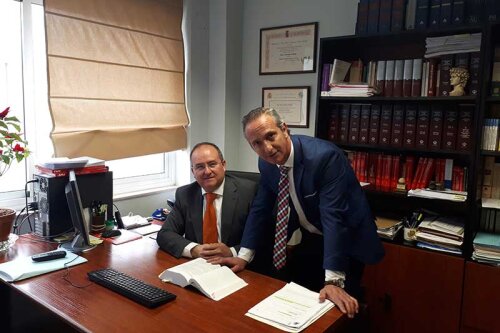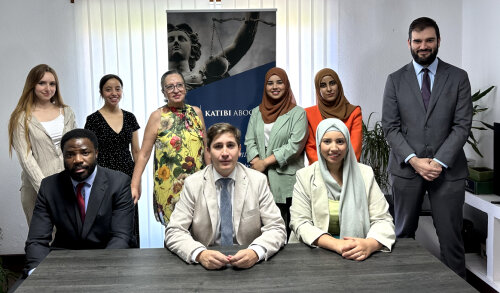Best Collaborative Law Lawyers in Cáceres
Share your needs with us, get contacted by law firms.
Free. Takes 2 min.
Free Guide to Hiring a Family Lawyer
List of the best lawyers in Cáceres, Spain
About Collaborative Law in Cáceres, Spain
Collaborative Law is an alternative dispute resolution process that empowers parties to resolve conflicts outside of the traditional courtroom setting. In Cáceres, Spain, Collaborative Law has gained traction as a way for people-particularly those involved in family, civil, or commercial disputes-to reach mutually beneficial agreements through cooperation and open dialogue, with the assistance of specially trained legal professionals. This approach emphasizes transparency, respect, and problem-solving, making it less adversarial and often more cost-effective than formal litigation.
Why You May Need a Lawyer
Even with the intention of resolving disputes amicably, legal guidance is essential in the Collaborative Law process. Common situations where individuals and businesses in Cáceres may require assistance include:
- Divorce and separation proceedings, including matters of child custody and division of assets
- Disagreements involving inheritance and succession
- Partnership or business disputes
- Neighbor or community conflicts
- Issues around contracts and obligations
A lawyer with experience in Collaborative Law can facilitate negotiations, ensure that one’s interests and rights are protected, and help draft binding agreements that comply with local laws.
Local Laws Overview
In Cáceres, as in the rest of Spain, Collaborative Law is recognized as part of the broader framework of alternative dispute resolution methods. Although there is no specific national law exclusively governing Collaborative Law, its principles are aligned with existing Spanish Civil and Civil Procedure Codes, along with the Law on Mediation in Civil and Commercial Matters (Ley 5/2012). Key aspects of local legal practice relevant to this approach include:
- Collaborative processes are voluntary and require all parties to agree to participate fully and transparently
- Lawyers who facilitate collaborative cases must receive specialized training to guide negotiations and ensure procedural fairness
- Any agreements reached can be rendered legally binding and enforceable if ratified before a notary or court
- Confidentiality is a cornerstone of the collaborative process, ensuring privacy for all participants
- If the collaborative process fails and court action is required, participating lawyers are usually disqualified from representing their clients in subsequent litigation, preserving trust in the process
Frequently Asked Questions
What is Collaborative Law?
Collaborative Law is a non-adversarial legal process that helps parties resolve disputes through joint negotiation, supported by trained legal professionals, without going to court.
How is Collaborative Law different from mediation?
While both are alternative dispute resolution methods, in Collaborative Law each party is represented by their own lawyer, while in mediation a neutral third party assists the negotiation but does not provide legal advice.
When is Collaborative Law most appropriate?
It is best suited for disputes where parties seek a mutually acceptable solution, such as in family law, business disagreements, or neighbor conflicts, and where there is willingness to negotiate in good faith.
Are agreements reached through Collaborative Law legally binding?
Yes, provided the agreement is formalized and, if necessary, ratified before a notary or court, it carries the same legal weight as court orders.
What happens if we cannot reach an agreement?
If an agreement cannot be reached, parties may pursue litigation, but the collaborative lawyers are generally disqualified from representing them in court.
How long does the collaborative process usually take?
Timeframes vary, but collaborative processes are often quicker than court proceedings-sometimes resolving within weeks or a few months, depending on complexity and cooperation.
What are the costs compared to traditional litigation?
Collaborative Law can be more cost-effective as it reduces court fees, speeds up the resolution, and focuses on cooperation rather than adversarial tactics.
Do both parties need to agree to use Collaborative Law?
Yes, participation is strictly voluntary and all parties must consent to negotiate collaboratively.
Can Collaborative Law be used for commercial disputes?
Absolutely. It is suitable for many types of civil and commercial disputes, provided both parties are committed to the process.
How do I find a qualified Collaborative Law lawyer in Cáceres?
You should look for lawyers who have specific training and experience in Collaborative Law and who are registered with local legal associations or professional bodies specializing in alternative dispute resolution.
Additional Resources
If you are considering Collaborative Law in Cáceres, the following resources may be helpful:
- Cáceres Bar Association (Ilustre Colegio de Abogados de Cáceres) - offers lists of practicing lawyers with expertise in dispute resolution
- General Council of Spanish Lawyers (Consejo General de la Abogacía Española) - provides information on recognized collaborative law professionals
- Local mediation centers - many mediators are also trained in collaborative techniques
- Family Mediation Services (Servicios de Mediación Familiar de Extremadura)
- Public legal advice services offered by the Ayuntamiento de Cáceres (the city council)
Next Steps
If you believe Collaborative Law may be right for your situation, consider the following steps:
- Reflect on your willingness and ability to engage in open, respectful negotiations
- Consult the Cáceres Bar Association or another trusted legal directory to identify trained Collaborative Law professionals in your area
- Schedule an initial consultation to discuss your case, the collaborative process, likely outcomes, and fees
- Work with your lawyer to approach the other party and invite them into the collaborative process
- Ensure you fully understand all agreements or documents before signing-your lawyer should guide you through every step
Remember, seeking early legal advice can help prevent misunderstandings and set the tone for a more effective and amicable resolution.
Lawzana helps you find the best lawyers and law firms in Cáceres through a curated and pre-screened list of qualified legal professionals. Our platform offers rankings and detailed profiles of attorneys and law firms, allowing you to compare based on practice areas, including Collaborative Law, experience, and client feedback.
Each profile includes a description of the firm's areas of practice, client reviews, team members and partners, year of establishment, spoken languages, office locations, contact information, social media presence, and any published articles or resources. Most firms on our platform speak English and are experienced in both local and international legal matters.
Get a quote from top-rated law firms in Cáceres, Spain — quickly, securely, and without unnecessary hassle.
Disclaimer:
The information provided on this page is for general informational purposes only and does not constitute legal advice. While we strive to ensure the accuracy and relevance of the content, legal information may change over time, and interpretations of the law can vary. You should always consult with a qualified legal professional for advice specific to your situation.
We disclaim all liability for actions taken or not taken based on the content of this page. If you believe any information is incorrect or outdated, please contact us, and we will review and update it where appropriate.
















